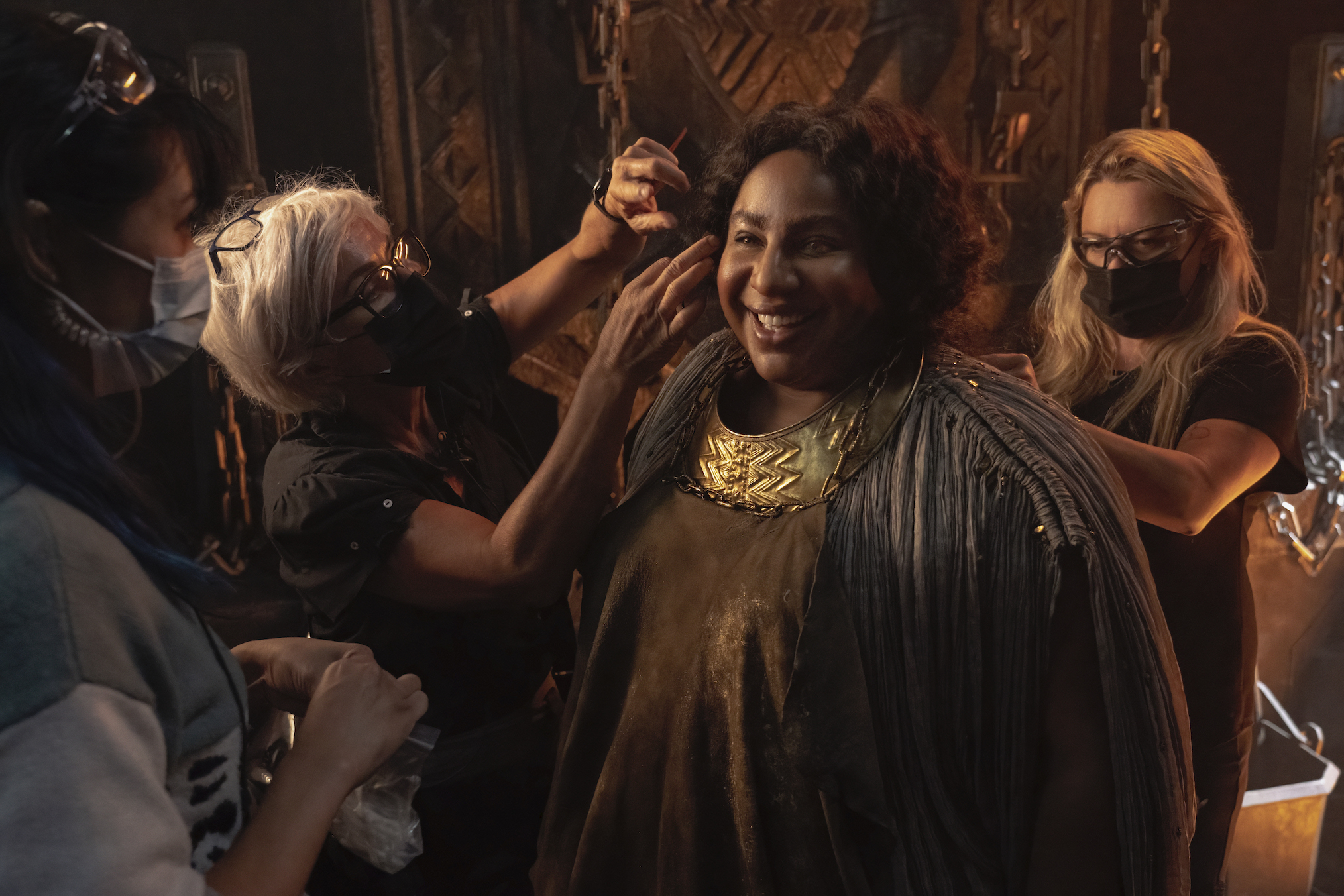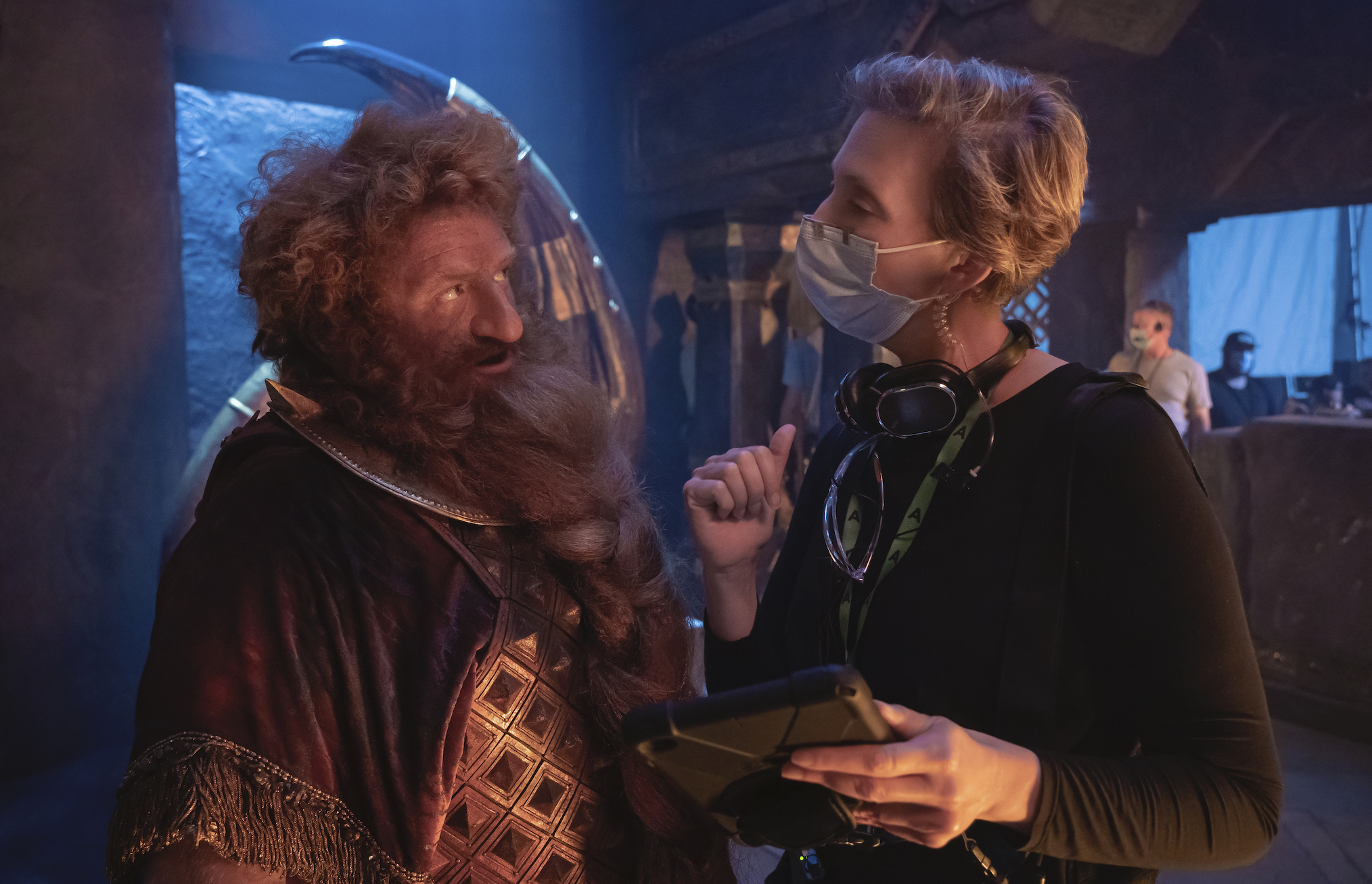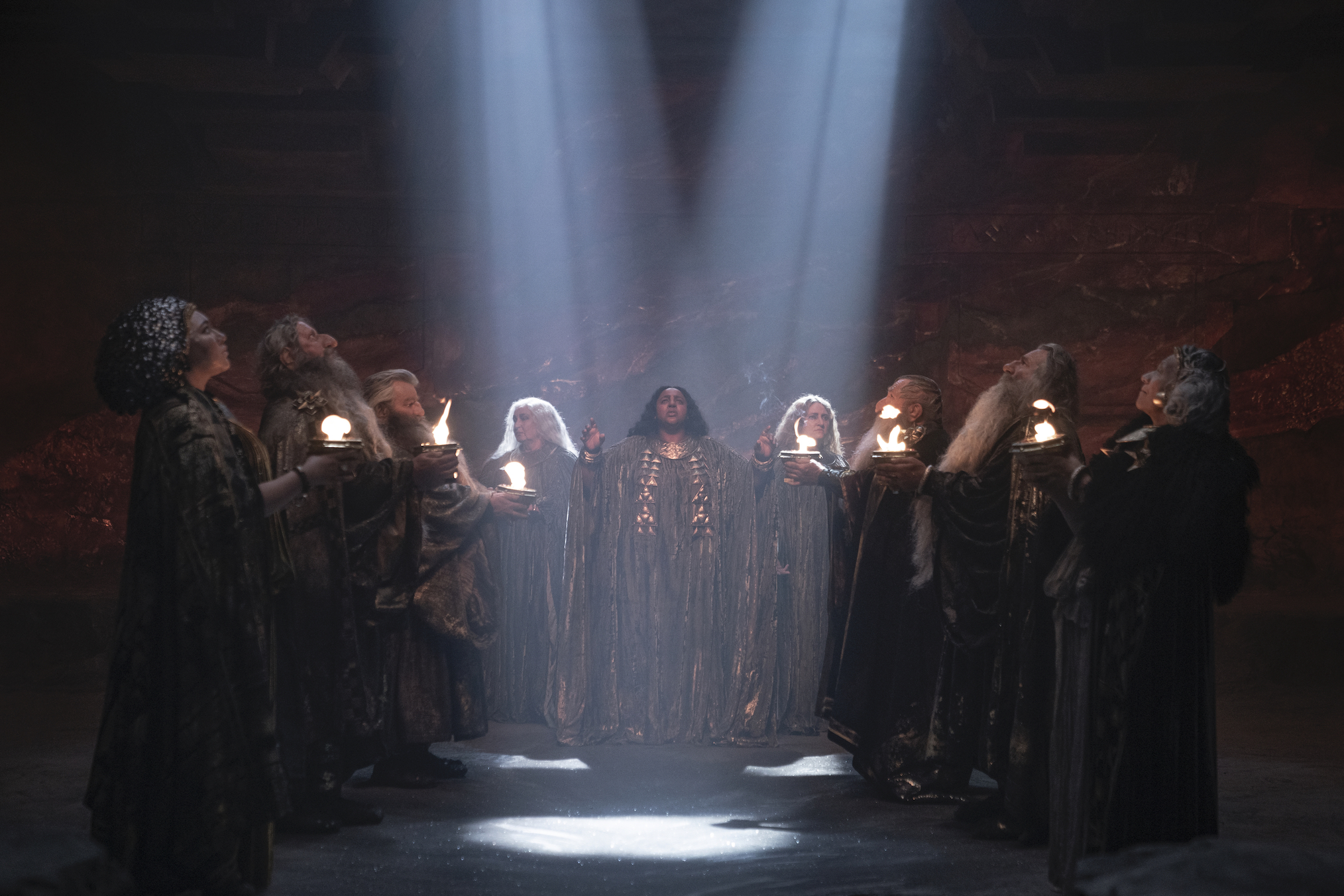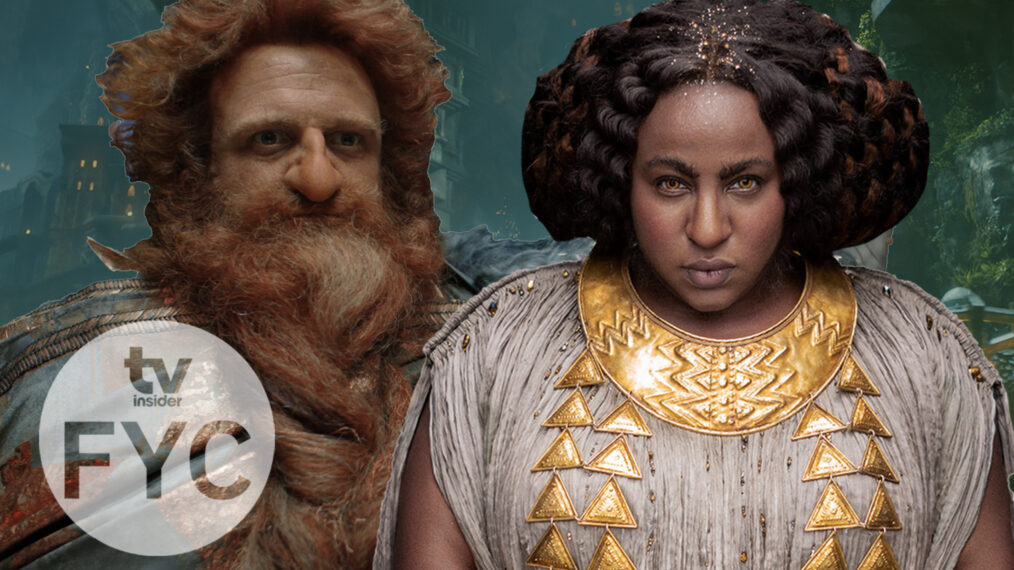The Lord of the Rings: The Rings of Power represents a slew of firsts for J.R.R. Tolkien screen adaptations. It’s the first time fans have seen stories from the Second Age of Middle-earth played out on screen (all previous versions are set in the Third Age), the first time kingdoms and cultures of Tolkienian lore have been seen before their tragic fates befell them, and, in what was particularly exciting for lovers of this world, the first time we’ve seen the Dwarves (including Dwarf women!) at their mightiest in the depths of Khazad-dûm.
The rich, thriving culture of the Dwarves, not its tragedies seen in The Fellowship of the Ring and The Hobbit trilogy, is finally shown in detail in the first season of Prime Video‘s fantasy epic, led by Owain Arthur and Sophia Nomvete‘s effortlessly charming Prince Durin IV and Princess Disa. Second only to the Hobbits, Dwarves have always provided big, boisterous humor and warmth in Tolkien’s world. Durin and Disa were instant fan-favorites when the series debuted in September 2022 because of that warmth and humor.
With Season 2 on the horizon and Emmys voting underway, TV Insider connected with Arthur and Nomvete to unpack how they brought the culture of the Dwarves to the screen through the endless supply of love Durin and Disa have for each other, their fellow Dwarves, and their outsider Elven friend, Robert Aramayo‘s Elrond.
Ben Rothstein/Prime Video
Tell me about your auditions.
Sophia Nomvete: We never auditioned together! They took a chance on us being together, because we didn’t have a chemistry test. It was really interesting, because in the beginning, I had absolutely no idea who I was playing and what the show was. But they described her as being a kind of joyful, strong, maternal character. And at the time, I was very, very pregnant. Maternal — I was like, I could do that one.
I went in for an audition and read this incredible script. They asked me to sing off the bat. They said, “Would you mind? If not, that’s absolutely fine. But if there’s something that you could do, we’d be really grateful.” So I sang Eva Cassidy’s version of “Ain’t No Sunshine.” So, that was my first audition. I had no idea of the story. Actually, when I think about “Ain’t No Sunshine,” it’s such a gorgeous, fitting song for Disa and Durin, for how she feels about him. It was all quite serendipitous.
Then I had my second audition, and then the call came in to say, “Pack your bags, you’re going to New Zealand. You’re playing Disa, our first female Dwarf to ever really be seen on screen in Tolkien’s world and wife to Owain Arthur playing Prince Durin.” It was pretty wild.
Owain Arthur: [My audition] was similar. Well, obviously we didn’t have a chemistry test, because I was in Serbia [filming a different project], so I couldn’t be released off set, which is why I couldn’t make it to the chemistry read, and therefore I was biting my nails kind of going, “Oh no! I might’ve missed it just because I wasn’t able to be there.” But then the phone call came in. [To Nomvete] You must have got me the job by being brilliant.
Nomvete: I didn’t even know that there was supposed to be a chemistry test. Maybe you were supposed to have a chemistry test with someone else… [Arthur laughs]


Sophia Nomvete as Disa behind the scenes of The Rings of Power Season 1 (Credit: Matt Grace/Prime Video)
So, you didn’t have a chemistry test. When you first met and started working together, did you feel an instant bond there, that you would work together well?
Arthur: Yeah, definitely. I met her at the apartments we were staying at. She came down in the lift with an entourage behind her, her daughter in her left arm, and said, “Oh hello, love!” It was just instant.
Nomvete: Oh, the biggest hug. You just looked and me and said, “We’re gonna be all right.”
Arthur: You only need five seconds with her to know, “Well, there’s a hoot!” And luckily, that’s what we’ve had. We’ve just been very comfortable with each other.
That’s lovely. What I think viewers love most about your performances is the real love and warmth and humor that emanates from Durin and Disa. How did you get there?
Nomvete: What I think is lovely about them, and I think it’s really important, is that I feel like they’re a really iconic couple right now. They are a happy marriage. They are a united, strong couple that looks this way as well, I will say it. And I think that this is really important: They are so in love with each other, so comfortable, and so real and authentic in what many marriages look like. I just find them really relatable.
I said it earlier, and I’ll say it again, it was really important that Disa was in no way subservient or played “the wife of,” and she’s not. In order to be able to do that, you need a character who is strong enough in their own power, in their confidence to allow the woman or “the wife of” to shine in that way. And both Durin and Owain have that in abundance.
They are so respectful of Disa/Sophia, that it’s easy to kind of rise to the challenge. And thus Durin and Disa are born, who are hilarious and wonderful and strong and so desperately in love and unapologetic in showing that, but who also have their tussles, which is so true of any relationship, friendship, and marriage. It was a really exciting opportunity, because the culture of the Dwarves says, “Go.” If you’re angry, you are smashing rocks. If you are in love, you are kissing with the hardest passion. To play that we have to feel really safe in each other’s companies, and I think we do, so we have an opportunity to present a loving relationship, which is something we don’t see every day, particularly not in the fantasy genre.
Arthur: I’ll add onto that that we bring a working class element to Middle-earth as well and domesticity that’s quite relatable. I really think there’s a warmth in a working class marriage of welcoming anyone into your house and making them a cake and putting the kettle on so you can have a cuppa tea and a natter. That’s something that I find particularly warm between both of us. Even though we’re Prince and Princess, it’s cool to have an earthy and grounded couple that are just so in love with each other, lean on each other. They’re a proper partnership. That’s rare not just in fantasy, but in storytelling as well. There’s some challenges coming up as well. We are tested in Season 2, which is great.


Owain Arthur as Durin behind the scenes of The Rings of Power Season 1 (Credit: Matt Grace/Prime Video)
Would you say their relationship is unique for Dwarves in this world, or would you say they’re a prime example of Dwarf marriages?
Nomvete: Oh, that’s a really interesting question. I think in every world, relationships are different across the board. What we have tried to emulate is the culture of the Dwarf. We are creatures of Aulë, but with Aulë is Yavanna. We feel like we personify that kind of huge spiritual beginning, if you like. And I think across the whole Dwarven culture, we will always try to be that way.
Of course, every relationship is going to be different, but I think we do emulate that. Because one thing that Tolkien did say was, the Dwarves, particularly female and male, you can’t tell the difference. I’m paraphrasing, but as Tolkien invites us to interpret everything he writes in our own way, we took that and said, you’re absolutely right. What you can tell is their essence, their strength, their status, and their respect. That is what they are absolutely on par with. And so I would like to say that that filters across the whole Dwarven culture, that in any marriage, there’ll be no hierarchy.
There are some generational differences between Durin and his father, King Durin. Do you think their views on relationships are generationally different? Or do you think they would agree?
Arthur: There is a gap, I think, in both generations. I think Elrond’s effect on Durin has opened his eyes and has made him a bit further thinking than the rest in Khazad-dûm. And he’s constantly learning, as Elrond’s constantly learning, about Middle-earth, about himself. And therefore, maybe Durin III, played by the wonderful Peter Mullan, is not as open-minded, not as far-reaching as Durin is.
It kind of holds a mirror to what our society is going through today, in the changes that have happened and the development for the good that’s happening now. But at the same time, I think both hearts are full of love and an openness. Certainly, in the first season, everything is done for what they think is the right thing. Whether we as an audience agree with that or not, I think it’s interesting to explore that avenue of, yeah, of course, everybody has a good point for the reason they’re doing something. It’s all out of love, but how far into the darkness are you willing to go to achieve that greater good?
As you said, Disa is the first Dwarf woman character we’ve seen in this universe. What are the key traits you wanted to bring out in Disa that differentiate the Dwarf women from the Dwarf men?
Nomvete: I wanted to bring out the joyful, exciting strength in a roller coaster that is female. The reality is that we are in a society where we’re now exploring the strength of a female. And I think sometimes we can be closed into what that looks like. We have to be strong, we have to advocate for ourselves, we have to be fearless in our approach, too. But I think my take on Disa, which has been really helpful for me as a woman in this space and in the space of the world, is that we should just celebrate wherever it is that we’re at.


Disa sings to the mountain as part of a resonating ceremony in Khazad-dûm in The Rings of Power Season 1 (Credit: Ben Rothstein/Prime Video)
We’re usually at a hell of a lot of places, sometimes in just one day, of being fearless, being absolutely terrified, being joyful, and being struck by a feeling that takes us into the depths of sadness.
Being so strong and being able to fight for ourselves, and then shaking in a corner when we simply just don’t have the strength. Being a mother, being a parent, and having to hold a space in a world that has predominantly been a certain way, what does that look like? How do we do that? How do we fight for that respect with joy, with happiness, with openness, education, and understanding in our hearts? And so I wanted to emulate all of that in Disa and just shower it with the warmth and the love so that she wasn’t too like, “This is what we do as women!” It’s all done with love, softness, intellect, intelligence, and forward thinking.
Arthur: She’s special as well because she’s a Resonator. That’s something that I always look at as Durin in amazement and wonder and just pure, “Do the resonating thing again!” That’s something that’s really special about Soph as well. She’s got a belting voice. Belting.
What are you proudest of with your performances in Season 1?
Nomvete: I’m proud of the uniqueness of their relationship and what we’ve done with Khazad-dûm, with all the relationships within Khazad-dûm. I’m proud of what we represent in the fantasy world in terms of just something that we haven’t seen before. And I’m proud of being able to push every emotion to its absolute limit. I like to think — and we often hear, thankfully — that we’ve touched fans in a way that they haven’t really seen before. They haven’t seen Khazad-dûm in this way. They haven’t seen the Dwarves in this way. It feels like a world of firsts, and I feel really proud that we’ve managed to achieve that relatively unscathed. [Laughs]
Arthur: I’m proud of the work that we’ve done. The amount of work that we’ve done personally into the research of our characters, to our friendship, and to our relationship and to live that moment in the home. I know I’ve worked hard for this, and therefore I’m not doubting what I’ve done at all, which is kind of strange for an actor to say. I stand by my work here. It’s a bit of a milestone, I suppose, for an actor to be proud of his work.
The Lord of the Rings: The Rings of Power, Season 1 Available Now, Prime Video
This story originally appeared on TV Insider

